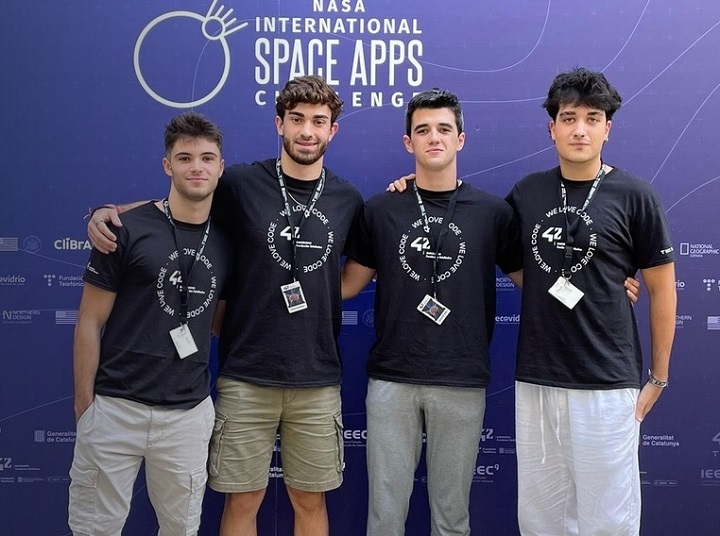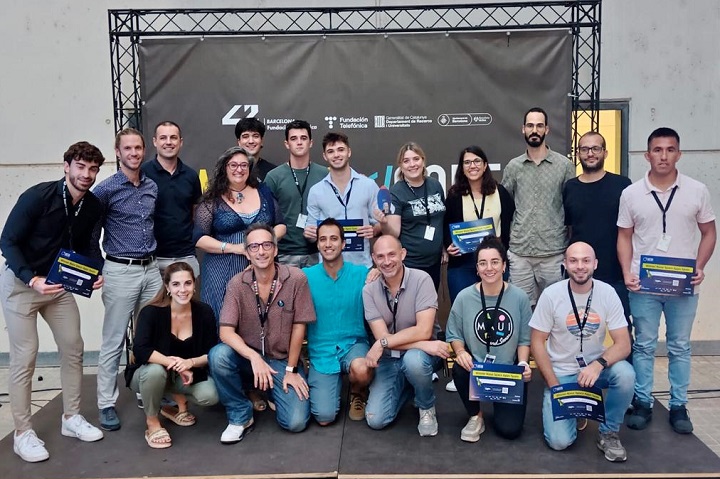The students of the Faculty of Physics Lluc Campins Sastre and Javier Lalueza Puértolas, winners of the NASA International Space Apps Spain in Barcelona

The Delfos Freaks team, formed by the students Lluc Campins Sastre and Javier Lalueza Puértolas, from the Faculty of Physics of th eUniversity of Barcelona, and Lluís Llull Riera and Ivan Serrano Hernández, from the Faculty of Computer Science of the Universitat Politècnica de Catalunya, has won the NASA Space Apps Spain in Barcelona together with the Galactic Space Coders group.

The Delfos Freaks team, formed by the students Lluc Campins Sastre and Javier Lalueza Puértolas, from the Faculty of Physics of th eUniversity of Barcelona, and Lluís Llull Riera and Ivan Serrano Hernández, from the Faculty of Computer Science of the Universitat Politècnica de Catalunya, has won the NASA Space Apps Spain in Barcelona together with the Galactic Space Coders group.
From 6 to 9 October, the NASA International Space Apps hackathon took place in Barcelona, an initiative supported by nine space agencies from around the world, one of which is the European Space Agency (ESA), of which Spain is a member. The 48-hour event brought together more than 50,000 people from all over the world to work on solving thirty real challenges posed by NASA scientists and engineers.
Apart from Barcelona, the hackathon was also held in Madrid, Seville, Malaga, León and Urduliz (Bizkaia), where more than 500 science, technology, engineering, art and mathematics enthusiasts worked with real data to provide solutions to challenges related to space exploration, earth observation and satellites.
Award to UB students for predicting solar storms
The Delfos Freaks team has developed an artificial intelligence system that uses DSCOVR satellite data to predict geomagnetic storms that affect important systems such as GPS and power grids. Specifically, the award-winning students have designed a neural network to process this data and improve the accuracy of the predictions so that organizations have relevant information to protect their satellites and predict the impact on communications networks.
The Galactic Space Coders team, made up of six web developers, presented The Phytoplankton Adventure project, an educational web game that immerses players in the world of phytoplankton and the oceans. By protecting virtual phytoplankton, players understand their role in balancing the oceans and fighting climate change by absorbing carbon dioxide. The project is free on the GitHub platform and is aimed at students, willing to raise awareness on the importance of oceans and phytoplankton in a fun way.
A committee of experts will evaluate the winning projects and the finalists between October and December to select the ten best proposals to be presented to NASA experts at the Kennedy Space Center (Cape Canaveral, USA).
Artemis: an artificial intelligence mentor
During the hackathon, participants were assisted by Artemis, the first Artificial Intelligence (AI) mentor, created by Clibrain and Emotionhack, which was accessible to more than 500 hackathon participants across the country in a pioneering pilot project.
Artemis is an emotional guide designed to complement the participants' technical knowledge and bring out its full value. This AI mentor has helped them manage their emotions, resolve team blocks and effectively communicate their ideas to the jury.
Artemis is ready to detect the emotions and challenges that participants and teams may encounter during the hackathon. This pilot will provide insight into how people relate to AI in a professional context, how they share their concerns and emotions, and whether having this kind of support can really improve the performance and productivity of teams.
Multimedia gallery

